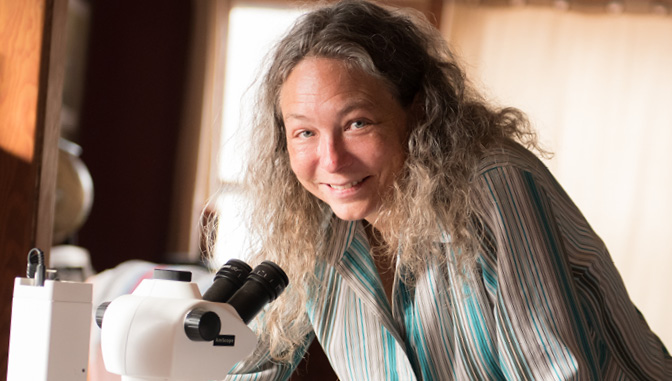Faculty Focus: Sandra Adams

Sandra Adams has been studying molecular biology for more than 20 years, specifically directing laboratory operations at the University of Wisconsin where they research the symbioses between leaf-cutter ants, fungi, and bacteria. The biologist has been with Excelsior College since 2011, teaching BIO 110 Biology (Non-Lab), BIO 212 Microbiology, and BIO 360 Developmental Biology. She is dedicated to her students’ success and encourages them to get hands-on experience in their field of study.
Adams earned a Bachelor of Science in entomology from Washington State University and a Master of Science in microbiology from the University of Montana. Her primary research area is in molecular biology, focusing on how microbes facilitate insect and plant interactions. She explains, “For example, I have found that bacteria associated with bark beetles help breakdown the tree chemical defenses that would normally be toxic for survival. The association with these bacteria allow the beetle to live inside the tree and reproduce.” Interestingly, Adams also studies fermentation and yeast strains in the process of brewing beer and wine.
Adams enjoys that Excelsior’s students are a diverse population, coming from across the world. She knows first-hand how that can make learning hard, though, as she was raised in the military and moved often. “I use that experience and I try to let my students know that even though we are not in a traditional classroom and our time together will be short, I really do want to help them reach their goals,” she says. She notes that faculty like her love to share their experiences with students who have a thirst for knowledge.
Since most of her students are enrolled in the natural science program and planning to obtain jobs in a biology-related field, Adams encourages her students to gain hands-on experience, like volunteering at local nature centers. She also encourages them to read publications from professional associations in the fields they’re interested in and to participate in citizen science projects (projects where volunteers collect data to help scientists answer real-world questions). “Given Excelsior is an online platform, it is important for students to gain such experience in order to build relationships and gain such expertise to excel in their fields of study,” says Adams.
Adams wants her students to know that it’s okay to make mistakes and when the answers aren’t clear, to be patient. She has a variety of management tips for her students: “Study effectively, focus on tips, notes, and outlines that their instructor provides. I also encourage them to make a weekly spreadsheet to help them track what assignments are due and to ‘check’ them off when they are submitted.”
Her students have learned many tips from her, but Adams has also learned from her students to create an environment that helps everyone achieve their goals. When she first started teaching, Adams had a student in her class that was serving in a war zone. She recalls, “I was worried about his ability to complete his work on time, given his situation. When I expressed my concern, he replied. ‘Ma’am, with all due respect, taking this class with you reminds me that I will not always be in this place. Please hold me to the same standard as everyone else.’”
When she isn’t teaching or in the lab, you can find Adams sitting by the Clark Fork River in Montana with a book in her hand while her husband and son fish. You might also find her in the locations of a forest fire a year later; many ecosystems are not only dependent on fires but also prime habitats for fungi. “The year following a local fire, you will find me there [at the post-fire site], as they provide perfect habitat for morel mushrooms, and they are delicious!”



